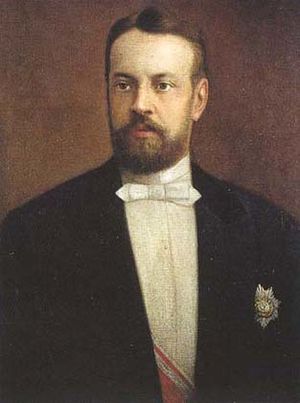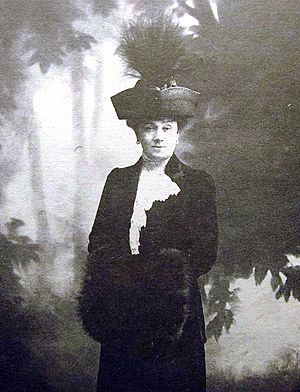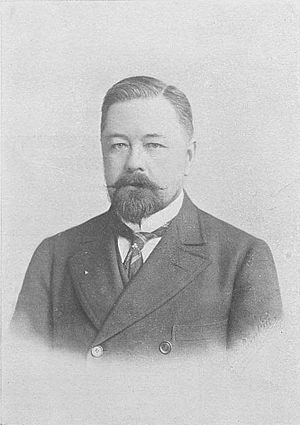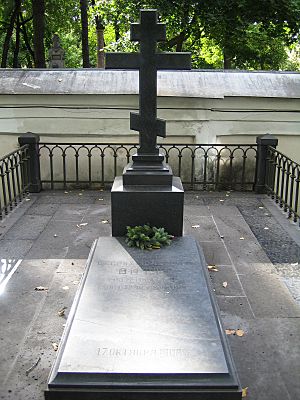Sergei Witte facts for kids
Quick facts for kids
Sergei Yulyevich Witte
Серге́й Ю́льевич Ви́тте |
|
|---|---|
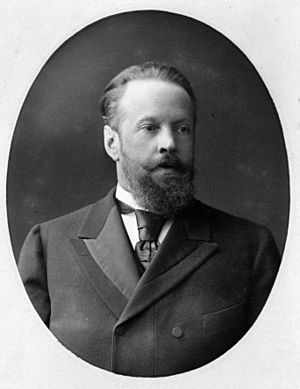
Sergei Witte, early 1880s
|
|
| 1st Prime Minister of Russia | |
| In office 6 November 1905 – 5 May 1906 |
|
| Monarch | Nicholas II |
| Preceded by | New Post (Himself as Chairman of the Committee of Ministers) |
| Succeeded by | Ivan Goremykin |
| Chairman of the Committee of Ministers | |
| In office 1903–1905 |
|
| Monarch | Nicholas II |
| Preceded by | Ivan Nikolayevich Durnovo |
| Succeeded by | Post abolished (Himself as Prime Minister) |
| 13th Finance Minister of Imperial Russia | |
| In office 30 August 1892 – 16 August 1903 |
|
| Preceded by | Ivan Vyshnegradsky |
| Succeeded by | Eduard Pleske |
| 14th Transport Minister of Imperial Russia | |
| In office February 1892 – August 1892 |
|
| Preceded by | Adolf Gibbenet |
| Succeeded by | Apollon Krivoshein |
| Personal details | |
| Born |
Sergei Yulyevich Witte
29 June 1849 Tiflis, Caucasus Viceroyalty, Russia (now Tbilisi, Georgia) |
| Died | 13 March 1915 (aged 65) Petrograd, Russia |
| Cause of death | Brain tumor |
| Resting place | Alexander Nevsky Monastery, Saint Petersburg, Russia |
| Nationality | Russian |
| Alma mater | Novorossiysk University |
| Signature | |
Sergei Yulyevich Witte (born June 29, 1849 – died March 13, 1915) was an important Russian leader. He became the first "Prime Minister" of the Russian Empire. This meant he led the government instead of the Tsar. Witte was known for bringing money from other countries to help Russia build more factories and industries. He also wanted to avoid wars.
Witte worked for the last two emperors of Russia, Alexander III and Nicholas II. During the Russo-Turkish War (1877–78), he managed all the trains carrying supplies to the front lines. From 1892 to 1903, he was the Minister of Finance. In this role, he helped Russia grow its industries and made the railway system a government-controlled business.
After a lot of protests and violence in 1905, known as the 1905 Russian Revolution, Witte helped create the October Manifesto. This document promised to set up a constitutional government. This meant the Tsar would share power. On October 20, 1905, Witte became the first Chairman of the Russian Council of Ministers, which was like being Prime Minister. He helped write Russia's first constitution. However, he soon lost favor because some people at court did not like these changes. He left his job before the first Duma (parliament) met in May 1906.
Many people see Witte as one of the most important figures in Russian politics around 1900. Historian Orlando Figes called him a "great reforming finance minister" and the person who created Russia's new parliament in 1905.
Contents
Early Life and Railway Career
Sergei Witte's father came from a German family. His mother's family was Russian. Sergei grew up on his grandparents' estate. His grandfather was a governor and a high-ranking official. Sergei had two brothers and two sisters. He studied in Tbilisi and later at Novorossiysk University in Odessa. He finished at the top of his class in 1870.
Witte first wanted to be a math professor. But his family thought this was not suitable for a noble. So, he was convinced to work in the railroad business. He trained for six months on the Odessa Railways. After that, he became the chief of the traffic office.
In 1875, there was a train crash on the Odessa Railways. Many people died. Witte was arrested and sentenced to prison. But while he was fighting the case, he did amazing work. He helped transport troops and supplies for the Russo-Turkish War. A powerful Grand Duke noticed his efforts. Witte's prison sentence was shortened to just two weeks. He had even created a new system to keep trains moving without delays.
In 1879, Witte moved to St. Petersburg. He later moved to Kiev. In 1883, he wrote a paper about railway prices. It also talked about social issues and the role of the monarchy. Witte became well-known in the government. In 1886, he became the manager of the Southwestern Railways. He made the railway more efficient and profitable. He also met Tsar Alexander III around this time. Witte warned the Tsar's helpers about using two powerful engines for the Royal Train. He said it was dangerous. His warning came true in 1888 when the train crashed. After this, Witte was made Director of State Railways.
Political Career
Leading the Railways
Witte worked in railway management for 20 years. He started as a ticket clerk. From 1889 to 1891, he was the Russian Director of Railway Affairs. During this time, he oversaw a big project to build more railways. Before him, only a small part of the railways was controlled by the state. Witte worked to expand the rail lines and make them a state-run business. He also made sure that employees were chosen for their skills, not for their family connections. In 1889, he wrote a paper saying that Russia needed strong industries. These industries should be protected from foreign competition by customs barriers (taxes on imported goods).
A new customs law was passed in 1891. This helped Russia's industries grow quickly by the early 1900s. Witte also believed in practical education. He said that state-run railways would not work well "unless it does its utmost for spreading technical education."
In 1892, Tsar Alexander III made Witte the acting Minister of Ways and Communications. This gave him control of all Russian railroads. He could also change the prices charged for transport. Russian railroads became very efficient. They made over 100 million gold rubles a year for the government.
In 1892, Witte met Matilda Ivanovna. He wanted to marry her. Their marriage caused a scandal because Matilda had been divorced. It made Witte lose some connections with the highest nobles. But the Tsar protected him.
Minister of Finance
In August 1892, Witte became the Minister of Finance. He held this job for 11 years. During his time, he sped up the building of the Trans-Siberian Railway. He also focused on creating schools to train people for industry. He chose his staff based on their skills and education. In 1894, he made a good trade agreement with Germany for Russia. When Tsar Alexander III died, he told his son, Nicholas II, to listen to Witte. He said Witte was his most capable minister.
In 1895, Witte created a state monopoly on alcohol. This meant the government controlled all alcohol sales. It became a major source of money for the Russian government. In 1896, he signed a treaty with China. This treaty allowed Russia to build the Chinese Eastern Railway across China. This railway shortened the path of the Trans-Siberian Railway to Vladivostok. However, Witte did not agree with Russia taking over the Liaodong Peninsula and building a naval base at Port Arthur in 1898.
Gold Standard and Reforms
In 1896, Witte made a big change to Russia's money system. He put the Russian ruble on the gold standard. This meant that the value of the ruble was tied to gold. This change brought more investments and foreign money into Russia. Witte also passed a law in 1897 that limited working hours in factories. In 1898, he changed taxes for businesses. In 1899, the Petrograd Polytechnical Institute was started because of his idea.
In 1898, he wrote a memo to the Tsar. He asked for a meeting to discuss changes for farmers. This led to talks about laws to help farmers own their land and move to new areas. Many of his ideas were later used by another leader, Pyotr Stolypin. By 1900, the growth of factories was much faster than before. Russia's trade in industrial goods was as big as Belgium's.
Relations with Japan
Witte managed Russia's policy in East Asia in the 1890s. He wanted peaceful trade with Japan and China. Japan had a strong, modern army. It easily defeated China in the First Sino-Japanese War (1894–95). Russia had to decide whether to work with Japan or protect China. Witte chose to protect China. In 1894, Russia, Germany, and France forced Japan to make its peace terms with China less harsh. Japan had to give back the Liaodong Peninsula and Port Arthur to China.
This made Japan angry. Japan saw Russia as its main enemy in its goal to control Manchuria, Korea, and China. Witte did not fully understand how strong Japan was becoming. Russia made an alliance with China in 1896. This led to Russia taking over the Liaodong Peninsula in 1898. Russia also made Port Arthur a strong naval base. It finished building the Chinese Eastern Railway across northern Manchuria. In 1899, the Boxer Rebellion started in China. Chinese people attacked foreigners. Many countries, including Russia and Japan, sent armies to help their people in China. Russia used this chance to send a large army into Manchuria. By 1900, Manchuria was under Russian control. Japan then got ready to fight Russia.
Losing Power
Witte had a political disagreement about land reform. He was accused of being part of a secret plot. His enemies wanted to remove him from power.
On August 16, 1903, Witte was made chairman of the Committee of Ministers. He held this job until October 1905. This was officially a promotion, but the job had no real power. Witte was removed from his powerful role as Minister of Finance because of pressure from landowners and his political enemies. Some historians also say it was because he did not agree with Russia's plans for Korea.
Diplomatic Work
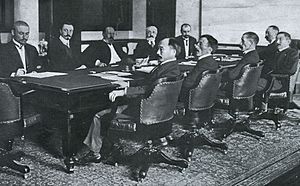
Witte was called back to help with growing unrest in Russia. After the Bloody Sunday riots in 1905, Witte suggested that the government issue a statement to address the people's demands. The Tsar asked Witte to lead a committee to create reforms. In June, there was a mutiny on the battleship Potemkin.
The Tsar asked Witte to negotiate an end to the Russo-Japanese War. Witte went to the United States for the peace talks. The talks were held in Portsmouth, New Hampshire.
Witte was praised for being a brilliant negotiator for Russia. Russia did not lose much in the final agreement. But losing the war with Japan was seen as the beginning of the end for Imperial Russia. For his efforts, Witte was given the title of Count.
After this success, Witte wrote to the Tsar. He said that Russia urgently needed political reforms at home. The Tsar issued a statement on August 6 that created a Duma (parliament). But it was only a body that could give advice. Its members were not directly elected. This proposal led to many protests and strikes across the country. This period became known as the Russian Revolution of 1905.
During this time, soldiers were sent out many times to stop the violence. Witte told Nicholas II that the country was close to a huge revolution. The Tsar's cousin, Grand Duke Nicholas, threatened to take his own life if the Tsar did not agree to Witte's ideas. So, Nicholas II had to agree to some changes. He accepted a plan that became known as the October Manifesto. This promised to give people civil liberties. These included freedom of conscience, speech, and association. It also promised a constitutional order and a Imperial Duma. Many Russians felt that this reform did not go far enough. It did not give all men the right to vote.
Leading the Council of Ministers
Witte described the government's actions during the crisis as "a mixture of cowardice, blindness and stupidity."
In October 1905, Witte met with the Tsar. He told the Tsar that Russia was on the edge of a huge revolution. He said it "would sweep away a thousand years of history." Witte gave the Tsar two choices: either appoint a military dictator or agree to big reforms. Witte wrote a plan for a manifesto. He said these reforms were needed to calm the people.
He suggested creating a legislative parliament (the Duma) that was elected by the people. He also wanted to grant civil liberties and set up a cabinet government. Witte said that using force would only be a short-term solution. He believed the army might not stay loyal if used against the people. Most of the Tsar's military advisers agreed with Witte. The Tsar finally agreed when his cousin, Grand Duke Nikolai, threatened to take his own life. The Tsar was embarrassed to be forced by a "railway clerk" to give up some of his power. Witte later said that the Tsar's court saw the Manifesto as a temporary step. They planned to go back to ruling alone when the revolution calmed down.
In October, Witte was asked to form Russia's first cabinet government. He offered jobs to some liberal leaders. But none of them agreed to join. So, Witte had to form his government from officials who were loyal to the Tsar. Many people did not trust this new government.
Witte believed that the Tsar's rule could only be saved by making Russia a modern industrial society. He thought that people should be encouraged to start businesses. He also believed that civil liberties should be guaranteed by law.
After the October Manifesto, there were attacks against Jewish people. These attacks were called pogroms. Witte ordered an investigation. It showed that the police in St. Petersburg had organized these attacks. They had given weapons and alcohol to the crowds. Witte demanded that the police chief be punished. But the Tsar stepped in and protected him. Witte believed that being against Jewish people was "fashionable" among the elite.
Witte was appointed as Chairman of the Council of Ministers, which was like being Prime Minister. He formed his own cabinet. The Tsar was no longer the head of the government. Witte immediately said that the head of the church, Konstantin Pobedonostsev, could not stay in office. He was replaced by Prince Alexey D. Obolensky.
Witte tried to get important loans from France to keep the government from going bankrupt. He sent someone to the Rothschild bank. They said they would help with the loan if Russia improved the lives of Jewish people. Witte felt it was wrong to link the loan to the "Jewish question," so he did not get their help.
On December 16, Trotsky and other leaders of the St. Petersburg Soviet were arrested. In the next few weeks, changes were made to the Russian Constitution of 1906. These changes confirmed that the Emperor was still in charge of foreign policy and the army. Ministers were still only responsible to Nicholas II, not to the Duma. The "peasant question" (land reforms) was a big issue. The influence of the Duma had to be limited. The Bolsheviks decided not to take part in the upcoming election. When Witte realized that Nicholas never planned to keep his promises, he resigned. He resigned on April 22, 1906.
Witte later said that the success of the police actions after the Moscow uprising in 1905 made him lose all influence over the Tsar.
In 1906, Father Gapon, a leader from the Bloody Sunday protests, returned to Russia. He supported Witte's government. Witte also suggested a law for religious tolerance. This law gave legal status to other religious groups. Witte believed that ending discrimination against other religions would help the Orthodox Church.
Member of the State Council
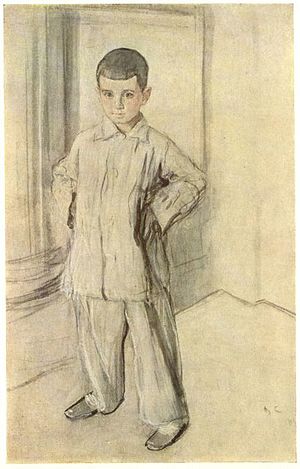
Some people thought Witte was the only talented person in the government. But they also believed he caused many problems for Russia. He weakened the Tsar's absolute rule from the inside. Witte lost the Tsar's trust. But he continued to be involved in Russian politics as a member of the State Council. He was never again given a main role in the government. Other Russian leaders avoided him. In January 1907, a bomb was found in his home. It was found that the Okhrana, the Tsar's secret police, was involved. Witte spent winters in France and started writing his Memoirs. He returned to St. Petersburg in 1908.
In 1914, during a time of great tension in Europe, Witte strongly urged the Tsar to avoid war. He warned that Europe would face disaster if Russia got involved. But the Tsar did not listen. Witte died in February 1915 at his home in St. Petersburg. His death was thought to be from meningitis or a brain tumor. His funeral was held at the Alexander Nevsky Lavra. On his grave, the date October 17, 1905, was carved. This was the day he presented the October Manifesto. Witte had no children of his own, but he adopted his wife's children from her first marriage.
Witte's reputation grew in the West after his secret memoirs were published in 1921. He had finished them in 1912. He had ordered that they should not be published until after he and other people from his time had passed away.
Honours
The Sergei Witte University of Moscow is named after him.
- Russian awards
- Knight of St. Stanislaus, 1st Class, 1890
- Knight of St. Anna, 1st Class, 1894
- Commemorative Medal of the Reign of Emperor Alexander III, 1896
- Emperor Nicholas II Coronation Medal, 1896
- Medal "For Works on the First General Population Census", 1897
- Knight of the White Eagle, 1904
- Knight of St. Alexander Nevsky, in Diamonds, 1906
- Red Cross Medal "In Commemoration of the Russo-Japanese War", 1906
- Commemorative Medal of the Romanov Tricentenary, 1913
- Knight of St. Vladimir, 1st Class, 1913
- Awards from other countries
 Siam: Grand Cross of the White Elephant, 1889
Siam: Grand Cross of the White Elephant, 1889 Emirate of Bukhara:
Emirate of Bukhara:
- Order of the Star of Bukhara, 1st Class in Diamonds, 1893
- Order of the Sun of Alexander, 1902
 France: Grand Cross of the Legion of Honour, January 1894
France: Grand Cross of the Legion of Honour, January 1894 German Empire:
German Empire:
- Grand Cross of the Red Eagle, 1894; with Collar, 1905
- Knight of the Prussian Crown, 1st Class, 1896
- Knight of the Black Eagle, July 1897
 Austria-Hungary: Grand Cross of the Imperial Order of Leopold, 1894; in Diamonds, 1897
Austria-Hungary: Grand Cross of the Imperial Order of Leopold, 1894; in Diamonds, 1897 Kingdom of Serbia:
Kingdom of Serbia:
- Grand Cross of the Cross of Takovo, 1894
- Grand Cross of the White Eagle, 1901
 Belgium: Grand Cordon of the Order of Leopold, 1894
Belgium: Grand Cordon of the Order of Leopold, 1894 Denmark: Grand Cross of the Dannebrog, 6 April 1895
Denmark: Grand Cross of the Dannebrog, 6 April 1895 Qing dynasty: Order of the Double Dragon, Class I Grade III, 1896
Qing dynasty: Order of the Double Dragon, Class I Grade III, 1896 Ethiopian Empire: Grand Cross of the Star of Ethiopia, 1896
Ethiopian Empire: Grand Cross of the Star of Ethiopia, 1896 Kingdom of Greece: Officer of the Redeemer, 1896; Grand Cross, 1898
Kingdom of Greece: Officer of the Redeemer, 1896; Grand Cross, 1898
 Sweden-Norway: Commander Grand Cross of the Order of Vasa, 1897
Sweden-Norway: Commander Grand Cross of the Order of Vasa, 1897 Principality of Bulgaria: Grand Cross of St. Alexander, 1898
Principality of Bulgaria: Grand Cross of St. Alexander, 1898 Kingdom of Romania: Grand Cross of the Star of Romania, 1898
Kingdom of Romania: Grand Cross of the Star of Romania, 1898 Persian Empire:
Persian Empire:
- Order of the Lion and the Sun, 1st Class in Diamonds, 1900
- Order of the August Portrait, in Diamonds, 1900
 Kingdom of Portugal: Grand Cross of the Military Order of Christ, 1900
Kingdom of Portugal: Grand Cross of the Military Order of Christ, 1900 Ottoman Empire: Order of Osmanieh, 1st Class in Diamonds, 1901
Ottoman Empire: Order of Osmanieh, 1st Class in Diamonds, 1901
Images for kids
-
Witte's grandson Lev Kyrillovich Naryshkin in a portrait by Valentin Serov
See also
 In Spanish: Serguéi Witte para niños
In Spanish: Serguéi Witte para niños
 | Emma Amos |
 | Edward Mitchell Bannister |
 | Larry D. Alexander |
 | Ernie Barnes |


